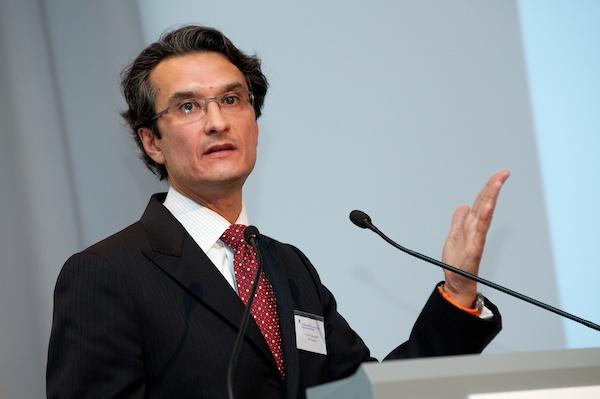In this interview Finance expert Arturo Bris analyses the risks associated with bitcoin.
Is there a speculative bitcoin bubble?
This is one of bitcoin’s major risks. The reason is that its supply is restricted. Unlike normal currencies, central banks cannot issue additional bitcoins when there is excessive demand from the market. I would call it a “rational bubble” similar to what happens in real estate markets, because the rise in prices is not caused by traders’ irrational behavior.
I suspect bitcoin is the typical instrument where at some point small, unprotected investors get caught and bear the big cost of a Ponzi scheme type of event. This could happen if the current liquidity in the bitcoin market vanishes. Big financial institutions would not come to the rescue. Banks don’t speculate with currencies, especially now that they are heavily regulated. And they will only enter into the bitcoin market once it is sanctioned by central banks and regulators, something that is unlikely to happen.
Do you see bitcoin posing any threat to the economy or traditional currencies?
An economy can adjust naturally to a new currency. We saw that in 2001 with the Euro. As with traditional currencies, certainly bitcoin—if successful—will hurt the weaker currencies the most. I doubt it will challenge the dominant position of the dollar, the euro or the yen.
Is bitcoin an ideal currency for illegal activity?
Quite the opposite. The ultimate owner of any single unit of bitcoin can be tracked through a central system, and any transaction is automatically recorded. This does not happen with traditional money.
Why has bitcoin grown in popularity and acceptance?
Consumers do not trust financial markets. There was a need to find innovative solutions to serve their financial needs.
Arturo Bris is Professor of Finance at IMD and directs the IMD World Competitiveness Center.
www.imd.org/about/facultystaff/bris.cfm
On October 2, IMD will host an event entitled “Bitcoin: Boom or Bust” featuring a debate between Arturo Bris and “Bitcoin Jesus” Roger Ver, the controversial millionaire bitcoin investor.
Is there a speculative bitcoin bubble?
This is one of bitcoin’s major risks. The reason is that its supply is restricted. Unlike normal currencies, central banks cannot issue additional bitcoins when there is excessive demand from the market. I would call it a “rational bubble” similar to what happens in real estate markets, because the rise in prices is not caused by traders’ irrational behavior.
I suspect bitcoin is the typical instrument where at some point small, unprotected investors get caught and bear the big cost of a Ponzi scheme type of event. This could happen if the current liquidity in the bitcoin market vanishes. Big financial institutions would not come to the rescue. Banks don’t speculate with currencies, especially now that they are heavily regulated. And they will only enter into the bitcoin market once it is sanctioned by central banks and regulators, something that is unlikely to happen.
Do you see bitcoin posing any threat to the economy or traditional currencies?
An economy can adjust naturally to a new currency. We saw that in 2001 with the Euro. As with traditional currencies, certainly bitcoin—if successful—will hurt the weaker currencies the most. I doubt it will challenge the dominant position of the dollar, the euro or the yen.
Is bitcoin an ideal currency for illegal activity?
Quite the opposite. The ultimate owner of any single unit of bitcoin can be tracked through a central system, and any transaction is automatically recorded. This does not happen with traditional money.
Why has bitcoin grown in popularity and acceptance?
Consumers do not trust financial markets. There was a need to find innovative solutions to serve their financial needs.
Arturo Bris is Professor of Finance at IMD and directs the IMD World Competitiveness Center.
www.imd.org/about/facultystaff/bris.cfm
On October 2, IMD will host an event entitled “Bitcoin: Boom or Bust” featuring a debate between Arturo Bris and “Bitcoin Jesus” Roger Ver, the controversial millionaire bitcoin investor.
Les médias du groupe Finyear
Lisez gratuitement chaque jour (5j/7) le quotidien Finyear.
Recevez chaque matin par mail la newsletter Finyear, une sélection quotidienne des meilleures infos et expertises de la finance d’entreprise.
Lien direct pour vous abonner : www.finyear.com/abonnement
Lisez gratuitement chaque mois :
- le magazine digital Finyear sur www.finyear.com/magazine
- la lettre digitale "Le Directeur Financier" sur www.finyear.com/ledirecteurfinancier
- la lettre digitale "Le Trésorier" sur www.finyear.com/letresorier
- la lettre digitale "Le Credit Manager" sur www.finyear.com/lecreditmanager
- la lettre digitale "Le Capital Investisseur" sur www.finyear.com/lecapitalinvestisseur
- la lettre digitale "GRC Manager" sur www.finyear.com/grcmanager
- la lettre digitale "Le Contrôleur de Gestion" (PROJET 2014) sur www.finyear.com/lecontroleurdegestion
Un seul formulaire d'abonnement pour 7 lettres
Recevez chaque matin par mail la newsletter Finyear, une sélection quotidienne des meilleures infos et expertises de la finance d’entreprise.
Lien direct pour vous abonner : www.finyear.com/abonnement
Lisez gratuitement chaque mois :
- le magazine digital Finyear sur www.finyear.com/magazine
- la lettre digitale "Le Directeur Financier" sur www.finyear.com/ledirecteurfinancier
- la lettre digitale "Le Trésorier" sur www.finyear.com/letresorier
- la lettre digitale "Le Credit Manager" sur www.finyear.com/lecreditmanager
- la lettre digitale "Le Capital Investisseur" sur www.finyear.com/lecapitalinvestisseur
- la lettre digitale "GRC Manager" sur www.finyear.com/grcmanager
- la lettre digitale "Le Contrôleur de Gestion" (PROJET 2014) sur www.finyear.com/lecontroleurdegestion
Un seul formulaire d'abonnement pour 7 lettres
Autres articles
-
Hong Kong : bientôt des premiers ETF Bitcoin ?
-
TMS Network (TMSN) Powers Up As Cryptocurrency Domain Appears Unstoppable. What Does This Mean For Dogecoin (DOGE) and Solana (SOL)?
-
The Growing Popularity of Crypto Payments: Could TMS Network (TMSN), Alchemy Pay (ACH), and Ripple (XRP) Lead The Way Despite The Whales?
-
DigiFT DEX Raises $10.5M in Pre-Series A Funding Led by Shanda Group
-
Giddy Wallet Announces First-Ever Autogas Feature for Polygon
















